常用系动词短语
- 格式:doc
- 大小:39.00 KB
- 文档页数:8
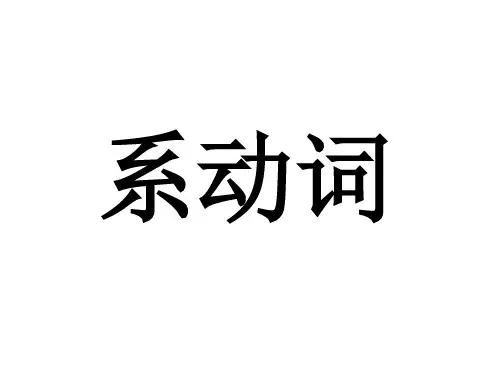
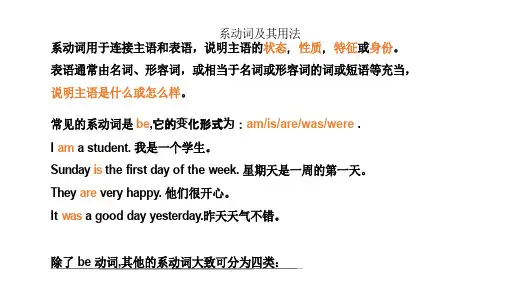
系动词及其用法系动词用于连接主语和表语,说明主语的状态,性质,特征或身份。
表语通常由名词、形容词,或相当于名词或形容词的词或短语等充当,说明主语是什么或怎么样。
常见的系动词是be,它的变化形式为:am/is/are/was/were.I am a student.我是一个学生。
Sunday is the first day of the week.星期天是一周的第一天。
They are very happy.他们很开心。
It was a good day yesterday.昨天天气不错。
除了be动词,其他的系动词大致可分为四类:1.“感觉”类:与五种感觉器官相关的动词。
常见的有:look(看起来),touch/feel(摸上去),smell(闻起来),taste(尝起来),sound(听起来)等。
例如:You don’t look happy.你看起来不开心。
Your hand feels cold.你的手摸起来很凉。
The flower smells good.这花闻起来很香。
The food tastes good.这食物尝起来味道很好。
Her voice sounds like my mother’s.她的声音听起来像我母亲的。
2.“主观判断”类:包括seem(似乎是),appear(似乎、显得),prove(证明是),turn out(结果是,证明是)等.例如:He appears/seem to be very friendly with us.他似乎对我们很友好。
These facts proves that he is a good student.这些事实证明他是一个好学生。
His plan turned out a success.他的计划结果是成功的。
(他的计划成功了。
)3.“状态变化”类:表示主语从一种状态变化成另一种状态。
常见的有:become,turn,grow,go,come,fall,get等。
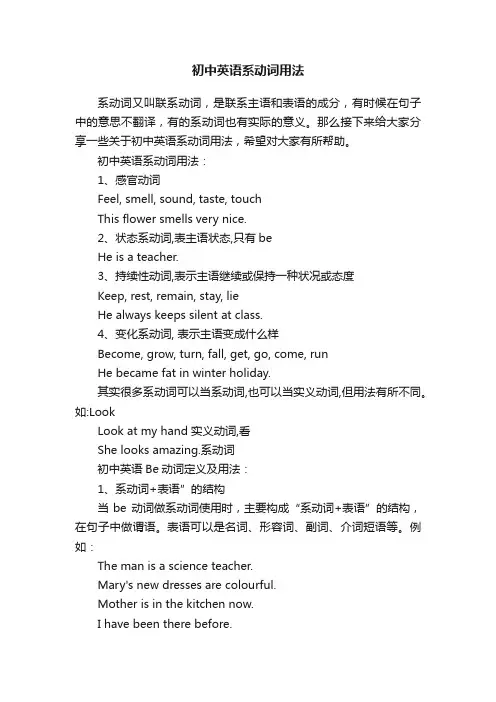
初中英语系动词用法系动词又叫联系动词,是联系主语和表语的成分,有时候在句子中的意思不翻译,有的系动词也有实际的意义。
那么接下来给大家分享一些关于初中英语系动词用法,希望对大家有所帮助。
初中英语系动词用法:1、感官动词Feel, smell, sound, taste, touchThis flower smells very nice.2、状态系动词,表主语状态,只有beHe is a teacher.3、持续性动词,表示主语继续或保持一种状况或态度Keep, rest, remain, stay, lieHe always keeps silent at class.4、变化系动词, 表示主语变成什么样Become, grow, turn, fall, get, go, come, runHe became fat in winter holiday.其实很多系动词可以当系动词,也可以当实义动词,但用法有所不同。
如:LookLook at my hand 实义动词,看She looks amazing.系动词初中英语Be动词定义及用法:1、系动词+表语”的结构当be 动词做系动词使用时,主要构成“系动词+表语”的结构,在句子中做谓语。
表语可以是名词、形容词、副词、介词短语等。
例如:The man is a science teacher.Mary's new dresses are colourful.Mother is in the kitchen now.I have been there before.They shall be here at 10:00 tommorow.That can't be true.You are not being very polite.Your brother is being very annoying this evening2、be 动词的一般疑问句,方法是把be 移到主语前面,也可说成是移到句首。
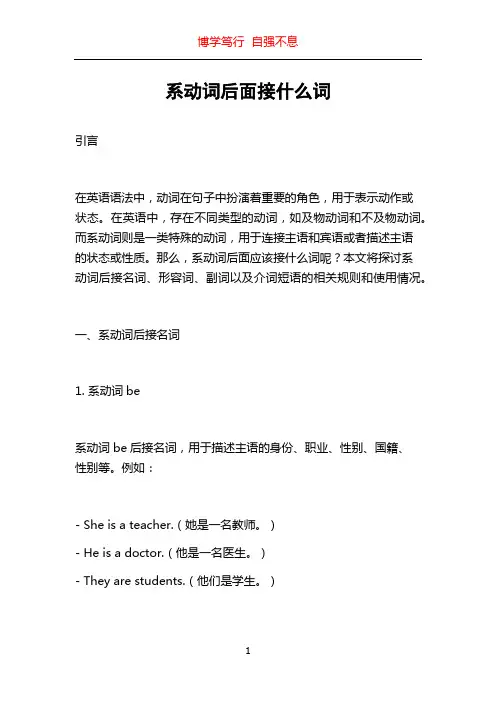
系动词后面接什么词引言在英语语法中,动词在句子中扮演着重要的角色,用于表示动作或状态。
在英语中,存在不同类型的动词,如及物动词和不及物动词。
而系动词则是一类特殊的动词,用于连接主语和宾语或者描述主语的状态或性质。
那么,系动词后面应该接什么词呢?本文将探讨系动词后接名词、形容词、副词以及介词短语的相关规则和使用情况。
一、系动词后接名词1. 系动词be系动词be后接名词,用于描述主语的身份、职业、性别、国籍、性别等。
例如:- She is a teacher.(她是一名教师。
)- He is a doctor.(他是一名医生。
)- They are students.(他们是学生。
)另外,系动词be后还可以接形容词转化成的名词,用于描述主语的状态或性质。
例如:- He is an introvert.(他是一个内向的人。
)- She is a perfectionist.(她是一个完美主义者。
)2. 系动词become系动词become后接名词,用于描述主语的转变或变化。
例如:- She became a successful entrepreneur.(她成为一名成功的企业家。
)- He became a father.(他成为了一个父亲。
)3. 其他系动词后接名词的情况除了be和become,还有其他系动词后可以接名词的情况,例如:- We elected him president.(我们选举他为总统。
)- They consider her a friend.(他们把她当作朋友。
)二、系动词后接形容词1. 系动词be系动词be后接形容词,用于描述主语的状态、性质、特征等。
例如:- He is tall.(他很高。
)- She is kind.(她很善良。
)- They are intelligent.(他们很聪明。
)2. 系动词feel、look、taste等除了be之外,还有一些其他系动词可后接形容词,例如:- The soup tastes delicious.(这汤尝起来很美味。
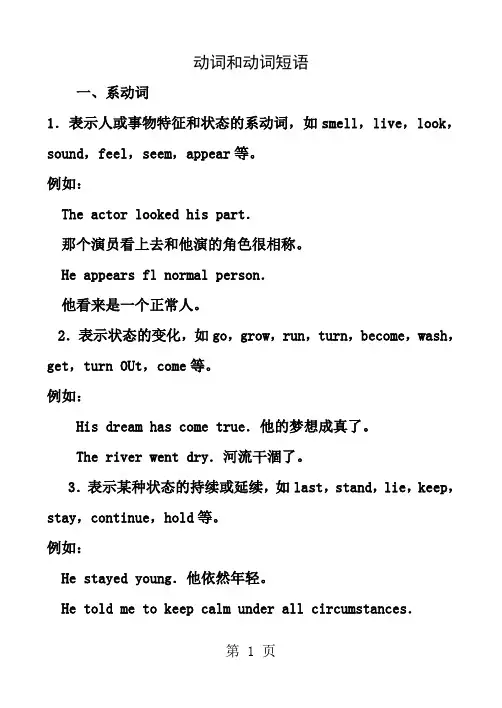
动词和动词短语一、系动词1.表示人或事物特征和状态的系动词,如smell,live,look,sound,feel,seem,appear等。
例如:The actor looked his part.那个演员看上去和他演的角色很相称。
He appears fl normal person.他看来是一个正常人。
2.表示状态的变化,如go,grow,run,turn,become,wash,get,turn OUt,come等。
例如:His dream has come true.他的梦想成真了。
The river went dry.河流干涸了。
3.表示某种状态的持续或延续,如last,stand,lie,keep,stay,continue,hold等。
例如:He stayed young.他依然年轻。
He told me to keep calm under all circumstances.他告诉我在任何情况下都要保持镇静。
注意:常用系动词及与之搭配的形容词:①feel:sorry,lonely,proud,shy。
happy等。
②get:late,fat,dark,worse,angry,well等。
③go:hungry,bad,lame,broken,mad,blind等。
④grow:worse,calm,cold,old,thin,big,fat,dark 等。
⑤keep:calm,fine,quiet,warm,happy等。
⑥look:strong,tired,fit,nervous,friendly,pretty,excellent等。
⑦remain:single,unmarried,calm,open,active,silent 等。
⑧prove:false,correct,easy,difficult,useful等。
⑨turn:yellow,grey,pale,red,black,green,cold等。
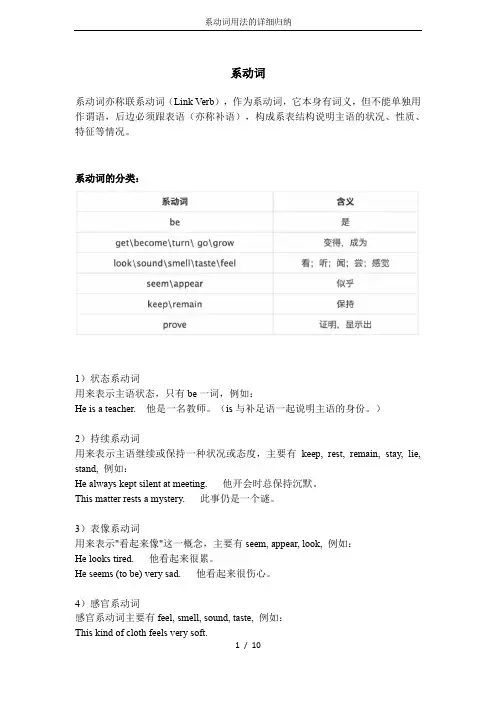
系动词系动词亦称联系动词(Link Verb),作为系动词,它本身有词义,但不能单独用作谓语,后边必须跟表语(亦称补语),构成系表结构说明主语的状况、性质、特征等情况。
系动词的分类:1)状态系动词用来表示主语状态,只有be一词,例如:He is a teacher.他是一名教师。
(is与补足语一起说明主语的身份。
)2)持续系动词用来表示主语继续或保持一种状况或态度,主要有keep, rest, remain, stay, lie, stand, 例如:He always kept silent at meeting.他开会时总保持沉默。
This matter rests a mystery.此事仍是一个谜。
3)表像系动词用来表示"看起来像"这一概念,主要有seem, appear, look, 例如:He looks tired.他看起来很累。
He seems (to be) very sad.他看起来很伤心。
4)感官系动词感官系动词主要有feel, smell, sound, taste, 例如:This kind of cloth feels very soft.这种布手感很软。
This flower smells very sweet.这朵花闻起来很香。
5)变化系动词这些系动词表示主语变成什么样,变化系动词主要有become, grow, turn, fall, get, go, come, run.例如:He became mad after that.自那之后,他疯了。
She grew rich within a short time.她没多长时间就富了。
6)终止系动词表示主语已终止动作,主要有prove, trun out, 表达"证实","变成"之意,例如:The rumor proved false.这谣言证实有假。
The search proved difficult.搜查证实很难。
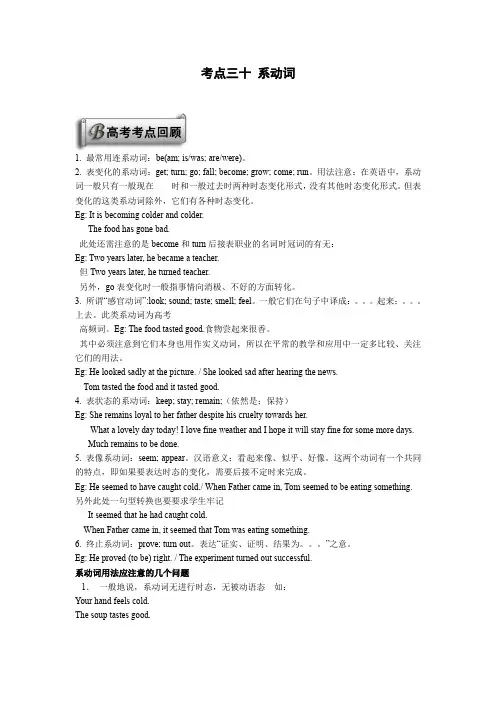
考点三十系动词1. 最常用连系动词:be(am; is/was; are/were)。
2. 表变化的系动词:get; turn; go; fall; become; grow; come; run。
用法注意:在英语中,系动词一般只有一般现在时和一般过去时两种时态变化形式,没有其他时态变化形式。
但表变化的这类系动词除外,它们有各种时态变化。
Eg: It is becoming colder and colder.The food has gone bad.此处还需注意的是become和turn后接表职业的名词时冠词的有无:Eg: Two years later, he became a teacher.但Two years later, he turned teacher.另外,go表变化时一般指事情向消极、不好的方面转化。
3. 所谓“感官动词”:look; sound; taste; smell; feel。
一般它们在句子中译成:。
起来;。
上去。
此类系动词为高考高频词。
Eg: The food tasted good.食物尝起来很香。
其中必须注意到它们本身也用作实义动词,所以在平常的教学和应用中一定多比较、关注它们的用法。
Eg: He looked sadly at the picture. / She looked sad after hearing the news.Tom tasted the food and it tasted good.4. 表状态的系动词:keep; stay; remain;(依然是;保持)Eg: She remains loyal to her father despite his cruelty towards her.What a lovely day today! I love fine weather and I hope it will stay fine for some more days.Much remains to be done.5. 表像系动词:seem; appear。
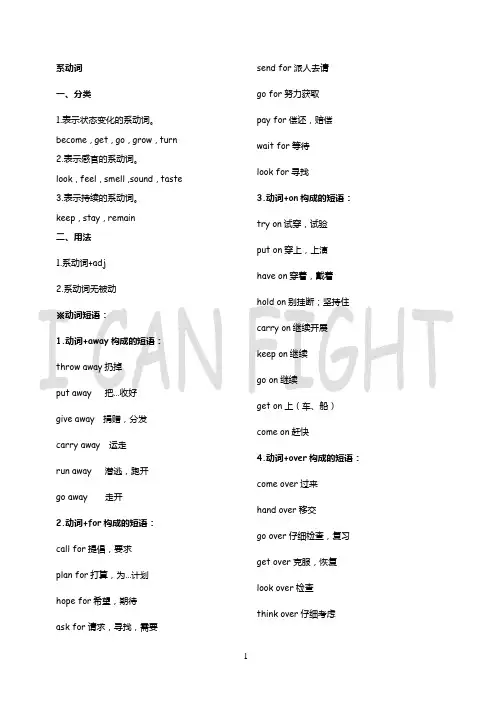
系动词一、分类1.表示状态变化的系动词。
become , get , go , grow , turn2.表示感官的系动词。
look , feel , smell ,sound , taste 3.表示持续的系动词。
keep , stay , remain二、用法1.系动词+adj2.系动词无被动※动词短语:1.动词+away构成的短语:throw away扔掉put away 把…收好give away 捐赠,分发carry away 运走run away 潜逃,跑开go away 走开2.动词+for构成的短语:call for提倡,要求plan for打算,为…计划hope for希望,期待ask for请求,寻找,需要send for派人去请go for努力获取pay for偿还,赔偿wait for等待look for寻找3.动词+on构成的短语:try on试穿,试验put on穿上,上演have on穿着,戴着hold on别挂断;坚持住carry on继续开展keep on继续go on继续get on上(车、船)come on赶快4.动词+over构成的短语:come over过来hand over移交go over仔细检查,复习get over克服,恢复look over检查think over仔细考虑take over接受,接管turn over翻转5.动词+up构成的短语:bring up抚育,培养call up召唤,打电话给come up走进,上来cut up切碎fix up修理give up放弃go up上升,增长grow up长大look up尊敬,向上看,查寻make up虚构,弥补,组成put up举起,搭建;张贴pick up捡起,(开车)接某人,偶然得到set up建立,创纪录send up发射show up揭露,露面turn up出现,把…调高一点take up占据;开始从事6.动词+out构成的短语:work out算出look out当心,小心turn out结果证明是put out扑灭,熄灭,伸出come out出来,开花,出版,发行break out战争、火灾、洪水爆发set out着手,出发,起程keep out把---挡在外面go out出去,熄灭wear out穿破run out用完give out放出、发出(光、热等);耗尽、用完;筋疲力尽7.break +介词/副词的短语:break down出故障,身体垮掉break out爆发break through突破,突围break off中断,突然停止break up打碎,分解,驱散break in打断,闯入break into破门而入break away突然离开,逃脱,脱离8.bring +介词/副词的短语:bring about使发生bring back拿回来,使恢复bring down打倒,降低,推翻bring in引进bring out出版,生产bring up培养,养育9.call +介词/副词的短语:call after以---命名call back召回call up征召入伍,给某人打电话,使想起call on号召,拜访某人call in召集call off取消e +介词/副词的短语:come in进来come from来自于come about产生come over过来come out出来,出现,出版come by从旁经过come up上来,走进come across偶遇come after跟着---来come back回来come around恢复知觉,回来come down下来,倒塌11.cut +介词/副词的短语:cut in插嘴,插入cut across抄近路cut off切断cut up切碎cut down砍倒,削减cut out切掉,裁剪出12.get +介词/副词的短语:get through通过,度过,打通(电话)get in进入,陷入get on上车,进展,融洽相处get off下车,下来get across通过,被理解get along进展,融洽相处get away离开,脱身13.give +介词/副词的短语:give up放弃give in屈服,投降give away赠送,捐赠,泄漏give over移交,交出give off放出(气味),发出give out分发,放出(光、热) give back归还14.go +介词/副词的短语:go ahead着手,开始(做),进行go along进展,前进go around到处走动,顺便访问go away离去,走开go beyond超过go by过去,流逝go down下降go up上升go for喜欢go off离开,停止go over复习,温习go through经历,穿过15.look +介词/副词的短语:look after照顾,照料look up查阅look around环顾look at看look down朝下看look for寻找look into调查look out当心look through浏览,检查16.take +介词/副词的短语:take away拿走take down写下,记下take in欺骗;吸收,吸纳take off起飞;脱下take on 承担;呈现;开始雇佣take over 接收,接管take pictures照相take care of照顾,照料take up 占据;开始从事take it easy别紧张take me for example以我为例17.turn +介词/副词的短语:turn about/ round(使)向后转,转身turn against(使)反对(某人)turn away转过脸去,拒绝turn back往回走turn up调高,出现turn down调低,拒绝turn in上缴,上交turn into(使)变成turn off关掉turn on打开turn out生产,结果是turn to求助于,转向18.put +介词/副词的短语:put aside把---放在一边,积蓄put back把---放回原处put down放下,镇压put forward提出,建议put in放进put off推迟,拖延put on穿上,戴上,增加,上演put out扑灭;熄灭put up举起,张贴19.be/get/become +P.P./adj.+介词的短语:be dressed in穿着be fond of爱好,喜爱be lost in沉溺于be located in位于be used to 习惯于be curious about对---好奇be glad to乐意---be worried about=worry about担心be covered with 被…覆盖be/get ready for (doing ) sth.= be ready to do sth为…作好准备be surprised (at)对…感到惊讶be surprised to do sth. 对干某事感到很惊讶be interested in (doing) sth.对…有兴趣be born in/ on 出生于be on …在进行;在上演;(灯)亮着be able to do sth.= can do能够做…be afraid of (doing) sth /to do sth./ that从句害怕…/不敢做…/恐怕…)be angry with /about sb. 生某人的气be angry at/about sth. 生某事的气be a symbol of sth是…的象征be famous/known for sth. 以某物而著名be full of =be filled with sth.填/充/装be famous/known as+职业作为…而著名be famous/known to sb. 为某人所熟知be strict with sb对某人严格要求be strict in sth. 对某事严格要求be/come from来自…be hungry/thirsty/tired饿了/渴了/累了be (well) worth doing(非常)值得做…be covered with被…所覆盖…be in (great) need of (很)需要…be short of sth. 短缺…be in trouble/danger处于困境/危险中be late for … 迟到be made of sth.由…制成(能看出原材料)be made from sth.由…制成(看不出原材料)be made in +sp在某地制成be made by sb.被/由某人制成be made up of sth.由…组成be made into sth.某物被制成…be satisfied/pleased with对…感到满意be free 空闲的,有空be ill in bed卧病在床be busy doing/with sth忙于(做)某事。
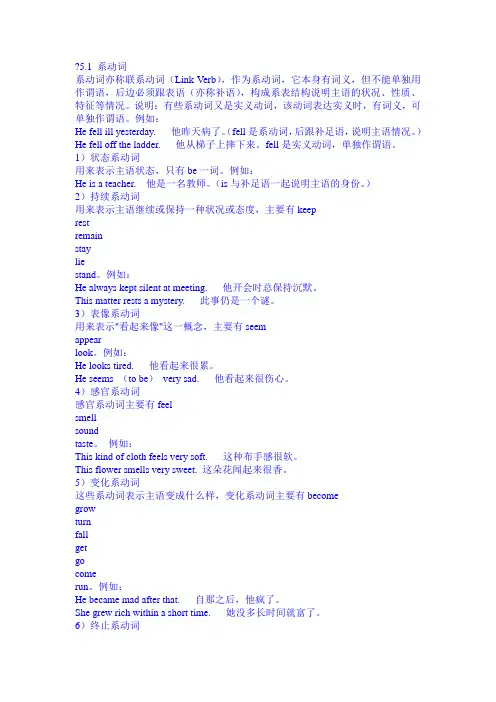
?5.1 系动词系动词亦称联系动词(Link Verb),作为系动词,它本身有词义,但不能单独用作谓语,后边必须跟表语(亦称补语),构成系表结构说明主语的状况、性质、特征等情况。
说明:有些系动词又是实义动词,该动词表达实义时,有词义,可单独作谓语。
例如:He fell ill yesterday.他昨天病了。
(fell是系动词,后跟补足语,说明主语情况。
)He fell off the ladder.他从梯子上摔下来。
fell是实义动词,单独作谓语。
1)状态系动词用来表示主语状态,只有be一词。
例如:He is a teacher.他是一名教师。
(is与补足语一起说明主语的身份。
)2)持续系动词用来表示主语继续或保持一种状况或态度,主要有keeprestremainstayliestand。
例如:He always kept silent at meeting.他开会时总保持沉默。
This matter rests a mystery.此事仍是一个谜。
3)表像系动词用来表示"看起来像"这一概念,主要有seemappearlook。
例如:He looks tired.他看起来很累。
He seems (to be)very sad.他看起来很伤心。
4)感官系动词感官系动词主要有feelsmellsoundtaste。
例如:This kind of cloth feels very soft.这种布手感很软。
This flower smells very sweet. 这朵花闻起来很香。
5)变化系动词这些系动词表示主语变成什么样,变化系动词主要有becomegrowturnfallgetgocomerun。
例如:He became mad after that.自那之后,他疯了。
She grew rich within a short time.她没多长时间就富了。
6)终止系动词表示主语已终止动作,主要有proveturn out表达"证实","变成"之意。
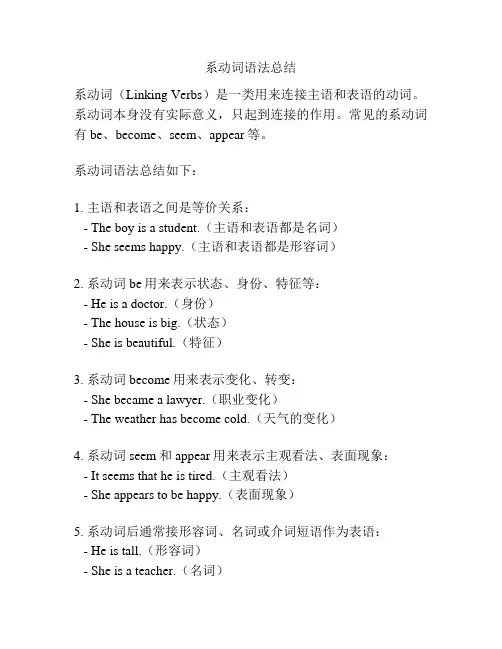
系动词语法总结
系动词(Linking Verbs)是一类用来连接主语和表语的动词。
系动词本身没有实际意义,只起到连接的作用。
常见的系动词有be、become、seem、appear等。
系动词语法总结如下:
1. 主语和表语之间是等价关系:
- The boy is a student.(主语和表语都是名词)
- She seems happy.(主语和表语都是形容词)
2. 系动词be用来表示状态、身份、特征等:
- He is a doctor.(身份)
- The house is big.(状态)
- She is beautiful.(特征)
3. 系动词become用来表示变化、转变:
- She became a lawyer.(职业变化)
- The weather has become cold.(天气的变化)
4. 系动词seem和appear用来表示主观看法、表面现象:
- It seems that he is tired.(主观看法)
- She appears to be happy.(表面现象)
5. 系动词后通常接形容词、名词或介词短语作为表语:
- He is tall.(形容词)
- She is a teacher.(名词)
- They are in the classroom.(介词短语)
6. 系动词后接形容词作表语时,可以用连系动词+形容词结构来修饰表语:
- The cake smells delicious.(连系动词+形容词结构)
7. 系动词后面可以加副词来修饰表语:
- She is extremely intelligent.(副词修饰形容词表语)。
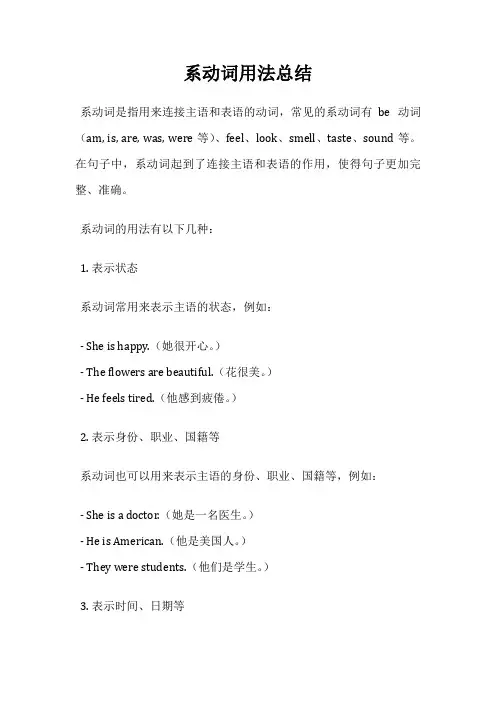
系动词用法总结系动词是指用来连接主语和表语的动词,常见的系动词有be动词(am, is, are, was, were等)、feel、look、smell、taste、sound等。
在句子中,系动词起到了连接主语和表语的作用,使得句子更加完整、准确。
系动词的用法有以下几种:1. 表示状态系动词常用来表示主语的状态,例如:- She is happy.(她很开心。
)- The flowers are beautiful.(花很美。
)- He feels tired.(他感到疲倦。
)2. 表示身份、职业、国籍等系动词也可以用来表示主语的身份、职业、国籍等,例如:- She is a doctor.(她是一名医生。
)- He is American.(他是美国人。
)- They were students.(他们是学生。
)3. 表示时间、日期等系动词还可以用来表示时间、日期等,例如:- Today is Monday.(今天是星期一。
)- It is 3 o'clock.(现在是3点钟。
)- The party was on Saturday.(聚会是在星期六。
)4. 表示感官系动词还可以用来表示感官,例如:- The food smells delicious.(食物闻起来很香。
)- The music sounds beautiful.(音乐听起来很美。
)- The flowers look pretty.(花看起来很漂亮。
)需要注意的是,系动词后面的表语通常是形容词、名词或者介词短语。
例如:- She is happy.(表语是形容词。
)- He is a doctor.(表语是名词。
)- The party was on Saturday.(表语是介词短语。
)系动词也可以用于被动语态中,例如:- The book was written by him.(这本书是他写的。
)系动词在英语中是非常重要的一类动词,掌握好它的用法对于提高英语水平非常有帮助。
新概念英语:系动词的分类及用法大全系动词系动词亦称联系动词(Link Verb),作为系动词,它本身有词义,但不能单独用作谓语,后边必须跟表语(亦称补语),构成系表结构说明主语的状况、性质、特征等情况。
说明:有些系动词又是实义动词,该动词表达实义时,有词义,可单独作谓语,例如:He fell ill yesterday.他昨天病了。
(fell是系动词,后跟补足语,说明主语情况。
)He fell off the ladder.他从梯子上摔下来。
fell是实义动词,单独作谓语。
1)状态系动词用来表示主语状态,只有be一词,例如:He is a teacher. 他是一名教师。
(is与补足语一起说明主语的身份。
)2)持续系动词用来表示主语继续或保持一种状况或态度,主要有keep, rest, remain, stay, lie, stand, 例如:He always kept silent at meeting. 他开会时总保持沉默。
This matter rests a mystery. 此事仍是一个谜。
3)表像系动词用来表示"看起来像"这一概念,主要有seem, appear, look, 例如:He looks tired. 他看起来很累。
He seems (to be) very sad. 他看起来很伤心。
4)感官系动词感官系动词主要有feel, smell, sound, taste, 例如:This kind of cloth feels very soft.这种布手感很软。
This flower smells very sweet.这朵花闻起来很香。
5)变化系动词这些系动词表示主语变成什么样,变化系动词主要有become, grow, turn, fall, get, go, come, run.例如:He became mad after that. 自那之后,他疯了。
常用系动词辨析及搭配用法become,get,go,grow,run,turn等系动词辨析及搭配用法常见的“变成”类系动词有become, get, come, go, grow, fall, turn, run等,都表示从一种状态到另一种状态。
尽管意思都差不多,但搭配有差别,若不注意,运用时会出错。
我们要注意以下几个方面。
1. 形容词作表语。
go和come是一对相反的词。
''go+adj.''表示令人不快的事情,而''come+adj.''表示好的事情。
如:In hot weather, meat goes bad.Things will come righ in the end.go与come前面的主语一般是物。
如:误:She goes famous.正:She becomes(gets) famous.表语为mad,crazy(古怪的),blind, lame或表示颜色的词,go前面的主语可以是人。
如:He went mad.Hearing this, she went red.run后面接short,dry, low, deep等词,主语多为能流动,能消耗掉的东西。
如:Their money was running short.Still waters run deep.但wild作表语,主语可以是人,如:.Don't let the children run wild.grow与run相对,接表示人或物特征的静态形容词,也接表示天气的形容词,侧重于“逐渐变成”。
如:The girl grew thinner and thinner.Soon the sky grew light.turn多接表示颜色的形容词,也接表示天气的形容词,它侧重变得与以前完全不同。
如:The man turned blue with fear.The weather suddenly turned much colder.fall接asleep, silent等静态形容词和表示疾病的形容词,但不能接形容词比较级。
系动词(系+表=谓语)系动词亦称联系动词,作为系动词,它本身有词义,但不能单独用作谓语,后边必须跟表语构成“系动词+表语”结构,说明主语的状况、性质、特征等情况。
1)状态系动词:用来表示主语状态,只有be一词,例如:He is a teacher. 他是一名教师。
(is 与补足语一起说明主语的身份。
)2)持续系动词:keep, rest, remain, stay, lie, stand, 例如:He always kept silent at meetings. 3)“像”系动词:“看起来像"seem, appear, look, 例如:He looks tired.He seems (to be) very sad.4)感官系动词:feel, smell, sound, taste, 例如:This kind of cloth feels very soft. This flower smells very sweet.5)“变化”系动词:主语变成什么样,变化系动词主要有become, grow, turn, fall, get, go, come, run. 例如:He became mad 阿伯utEngliafter that.She grew rich within a short time. 6)终止系动词:表示主语已终止动作,主要有prove, trun out, 表达"证实","变成"之意,例如:The rumor proved false.The search proved difficult.His plan turned out a success.英语系动词的功能主要是把表语(名词、形容词、某些副词、非谓词、介词短语、从句)和它的主语联系在一起,说明主语的属性、特征或状态。
它有自己的但不完全的词义,不能在句中独立作谓语,必须和后面的表语一起构成句子的谓语(即:系+表=谓语)。
英语常用系动词英语常用连系动词连系动词也称系动词(Link Verb),它本身具有实在意义,但不能单独作谓语,后边必须加上表语共同构成复合谓语。
连系动词与其后面的表语合起来叫作系表结构。
系表结构主要是为了说明主语的状况、性质、特征等情况。
一、表示状态的系动词用来说明主语的状态,只有一个be,但be 在不同的人称和时态中有不同的形式,有am、are、is、was 和were ,后接名词、形容词、分词、不定式、副词和介词短语等作表语。
例如: The man is a science teacher.Mary's new dresses were colorful.二、表示持续性的系动词用来表示主语继续或保持一种状况或态度,主要有keep、remain、stay、lie、stand、continue 和rest等,例如:Please keep quiet.Several problems remain to be solved.I hope the weather will stay fine.The whole city lay in ruins after the earthquake.Mr. Black stands high in the public estimation.The weather continues cold.My grandfather will never rest idle.三、表“像”系动词用来表示“看起来像”这一概念,主要有seem、appear和look,例如:She seems very happy with the new job.He appeared to be talking to himself.She looks happy.四、感官系动词感官系动词主要有feel、smell、sound、taste 等,后面接形容词作表语,说明主语所处的状态,其意思分别为“摸/闻/听/尝起来……”。
感官系动词我们把后面接主语补充成分的动词称为系动词。
1. 最常用的系动词是be,另外还有5个感官系动词,如:look(看上去),taste(尝上去),feel(摸起来),smell(闻起来),sound(听起来)等。
例如:The film is interesting. 这部电影很有趣。
The cookies smell delicious. 这些曲奇闻起来很香。
The soup tastes too salty. 汤尝起来太咸了。
The bed feels hard. 这床摸上去很硬。
The idea sounds quite good. 这个想法听起来非常好。
All the children look happy. 所有的孩子看起来都很开心。
上面用到的系动词smell,taste,feel,sound,look相当于汉语中的闻起来,尝起来,摸上去,听上去,看起来的概念。
2. 要注意这类系动词和系动词be不同,其否定形式和疑问形式的构成要借助动词do。
例如:The dishes do not smell very nice. 这些菜闻起来不太好。
Does he look worried? 他看上去担心吗?The cake does not taste very good. 这尝起来不太好。
现在完成时(一)1. 现在完成时定义:强调过去发生的动作对现在造成的影响或结果。
例如:Betty went to the park yesterday. (强调去公园的动作发生在昨天)Betty has been to the park before. (强调不仅去过公园,而且了解公园的状况)2. 现在完成时的谓语结构:have/has + 动词的过去分词例如:Ive always wanted to go on a dream holiday.句中的谓语结构为:have wantedLingling has visited the US.句中的谓语结构为:has visited3. 句式结构(1)肯定句式:主语+have / has+动词过去分词+其他。
*be different from有差异的,不同于*be distinct from与……不同*be distinguished from可辨别的be diverse from和……不一样be divorced from与……离婚;脱离be far frocm远离;决不be free from免受……的be isolated from隔离的,孤立的be remote from远离be removed from远离的;疏远的be safe from安全的*be secure from/against没有……的危险*be separate from与……分离*be absorbed in专心,全神贯注*be involved in专心,专注*be abundant in丰富的,大量的be high in丰富的be rich in丰富的be plentiful in丰富的be accurate in准确的,精确的*be confident in/of对……有信心be deficient in缺少be interested in对……感兴趣*be proficient in熟练,精通be prompt in立即的,迅速的be punctual in准时的;按时的be qualified in胜任,合适be strict in sth.对某事严格be strong in擅长于be weak in薄弱的*be zealous in热心于be afraid of害怕be ashamed of为……惭愧,害臊*be aware of知道,意识到be born of出身于*be capable of能够,有能力be careful of要仔细,小心be careless of漫不经心的be cautious of小心谨慎的be certain of确信,有把握*be characteristic of特有的,独特的be clear of清除了,摆脱了*be conscious of意识到;知道*be considerate of体贴,为别人考虑*be critical of批评,谴责;感到不满be doubtful of对……怀疑*be economical of节俭,节省be empty of没有东西be envious of妒忌,羡慕be fearful of害怕,担心be fond of喜爱be free of免除;没有be frightened of害怕be full of充满*be guilty of内疚,犯(罪或过失)be hopeful of怀有希望*be ignorant of无知be impatient of不能忍受的*be independent of不信赖;与……无*be innocent of无罪,清白*be jealous of妒忌;爱惜be nervous of紧张,害怕be possessed of拥有,占有be proud of感到骄傲(自豪)be representative of代表be scared of害怕*be sensible of知道,意识到be short of缺乏……be shy of对……迟疑;有戒心*be sick of厌恶be sure of确信;对……有把握*be suspicious of怀疑……be terrified of受惊吓be thoughtful of深思;(常)想到be thoughtless of不考虑*be tired of厌倦,厌烦be true of对……适用;符合于*be typical of典型的,有代表性be uncertain of/about/as to对……不确定*be weary of对……厌烦be based on以……为基础*be bent on一心想,决心干……*be dependent on依靠,依赖be efficient on效率高,有能力be hard on严厉be heavy on对……严厉,严格*be intent on坚持要*be keen on喜爱,渴望be revenged on向……报复,报仇be rough on对人粗暴苛刻be accurate to准确,精确*be accustomed to习惯于*be adaptable to对……能适应be advantageous to对……有利*be agreeable to适合于;欣然同意*be applicable to可适用的*be beneficial to有利于,有益*be blind to视而不见be close to靠近;几乎be common to共同的be comparable to比得上的;可比的be contrary to与……相反be convenient to对……方便be cruel to残酷的*be dedicated to献身于,致力于be devoted to专心致力于;忠诚be engaged to与……定婚be entitled to给……权力(或资格)be equal to等于*be equivalent to相当于;等于*be essential to必不可少的,必要的*be exposed to暴露于*be faithful to忠实于be familiar to对……熟悉be fatal to致命的;具有毁灭性的be foreign to陌生,不熟悉be fundamental to必要的be gentle to温柔的*be grateful to感激的be harmful to有害的be helpful to有帮助的*be inclined to倾向于;常常*be identical to/with与……完全相同*be indifferent to对……漠不关心*be inferior to比……差,地位比……低*be superior to优于*be prior to在……之前*be previous to在……之前be junior to年幼于be senior to年长于be anterior to先于be posterior to(时间上)后于be kind to和蔼;友好*be liable to易于……的;可能*be loyal to忠诚于be married to和……结婚be necessary to必要的*be new to不熟悉,没有经验*be obliged to感激be open to开放的be opposite to相反的;对立的*be parallel to与……平行*be peculiar to……所特有的*be polite to有礼貌的*be preferable to更好的,更可取的be related to与……有关系be relative to和……相应,和……有关*be relevant to与……有关be responsible to sb. for sth.对……负责*be resistant to有抵抗力的;耐……的be rude to粗鲁的;无礼貌的*be sensitive to对……敏感be similar to与……类似,相似be strange to感到生疏*be subject to易于……的be suitable to适合be valuable to有价值的*be acquainted with认识某人,了解某物be angry with对某人生气be bored with对……厌烦*be busy with忙于*be comparable with可比较;比得上*be compatible with与……和谐共处;符合be concerned with与……有关;关心*be confronted with面临……*be consistent with与……一致;始终如一be consumed with被……吞食*be content with对……满足*be correspondent with与……相符be delighted with对……感到高兴*be faced with面临*be familiar with对……熟悉*be fed up with讨厌be filled with充满be frank with坦率be friendly with与……友好*be generous with/in大方,慷慨*be patient with有耐心*be popular with流行;为……所喜爱be satisfied with对……感到满意be scattered with散布,分布be seized with(疾病)侵袭be severe with严厉;苛刻*be strict with sb.对某人严格be stern with严厉;严格be thrifty with节省,节俭,简朴*be wrong with不正常;有毛病。